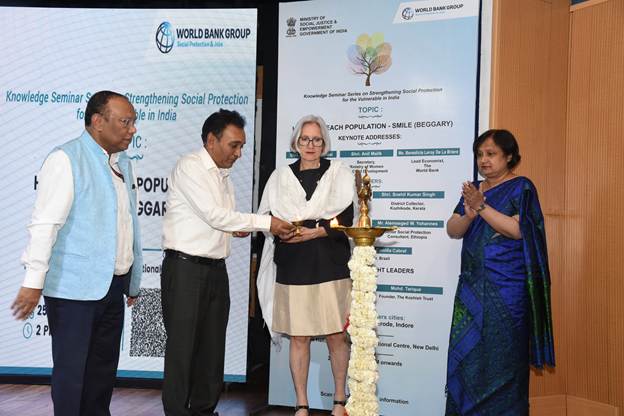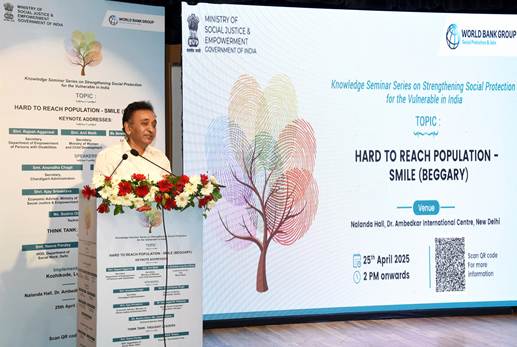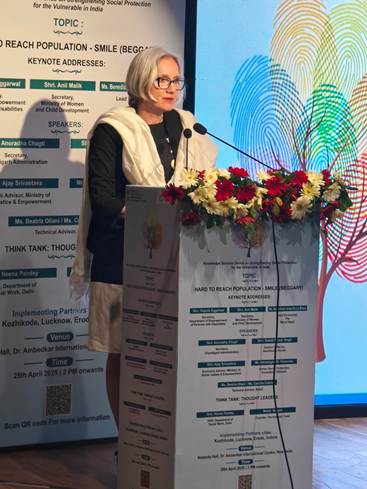Ministry of Social Justice & Empowerment
DoSJE and The World Bank Host Seminar to brainstorm on issues affecting Beggars, the Homeless, and the Destitute Population
Need to hear directly from those who have transitioned out of begging, to understand the root causes and impact of support systems: Secretary DEPwD
Such events provide valuable grassroots insights and authentic data from the field, essential to identifying and supporting individuals in vulnerable conditions: Lead Economist, World Bank
Posted On:
25 APR 2025 8:22PM by PIB Delhi
The Department of Social Justice and Empowerment (DoSJE), Government of India, in collaboration with the World Bank, organized a powerful and thought-provoking seminar with the theme - ‘Hard to Reach Population – SMILE (Beggary)’ - on 25th April, 2025, in New Delhi.

The objective of the seminar was to deliberate on strategies and share knowledge regarding the rehabilitation of beggars, the homeless, and the destitute population, with participation from both national and international experts. This event formed part of an ongoing knowledge seminar series aimed at deepening dialogue and action to strengthen social protection systems for the most vulnerable sections of society in India.
Addressing the Seminar as the Chief Guest, Shri Rajesh Aggarwal, Secretary, DEPwD, Ministry of Social Justice and Empowerment, shared his vision on inclusive development and disability-friendly outreach. He emphasized the need to hear directly from real stakeholders — those who have transitioned out of begging — to understand the root causes and impact of support systems. He also acknowledged the complexity of the issue, touching upon its social, religious, and economic dimensions.

On the other hand, the keynote address by Ms. Benedicte Leroy De La Briere, Lead Economist, World Bank, brought a global lens to the discussion on beggary rehabilitation. She highlighted the significance of the partnership between the World Bank and the Ministry of Social Justice, noting that such events provide valuable grassroots insights and authentic data from the field. They emphasized the importance of foundational documentation—such as having a registered address, a bank account, and access to healthcare—as essential to identifying and supporting individuals in vulnerable conditions. The representative concluded by stressing the need to focus today's discussion on targeted interventions and actionable solutions.

Key Highlights of the Seminar:
Shri Ajay Srivastava, Economic Advisor (MoSJ&E), shared that approximately 18,000 individuals have been identified under the SMILE initiative, of which 1,612 have already been rehabilitated. He assured that efforts are underway to accelerate the rehabilitation of the remaining individuals. Ms. Debolina Thakur, Joint Secretary and Economic Advisor (DoSJ&E), also addressed the gathering, highlighting that many social challenges are shared globally. She noted that several international organizations are actively working to address these issues, and India too has many institutions making commendable efforts.
Global Best Practices:
Mr. Alemseged W Yohannes Bedane, Senior Social Protection Consultant, Ethiopia, shared the success story of the Urban Destitute Support Programme, which has led to the rehabilitation of thousands of homeless individuals. From Brazil, Ms. Beatriz Oliani and Ms. Camila Cabral presented São Paulo city’s progressive policies and urban social welfare strategies.
Initiatives from across India:
The seminar featured compelling presentations by nodal officers and grassroots organizations. Notable contributions came from Ms. Anuradha Chagti (Secretary, Social Welfare, Chandigarh Administration), Shri Snehil Kumar Singh (District Collector, Kozhikode). Partner organizations including Atchayam Trust (Tamil Nadu), PRAWES Rehabilitation Centre (Madhya Pradesh), UMMEED (Uttar Pradesh), and Udayam Homes (Kerala), also shared on-the-ground realities, challenges, and success stories in engaging with hard-to-reach populations. Further, Ms. Neena Pandey, Head of the Department of Social Work, and Dr. Tarique, Founder of Koshish Trust, delivered insightful presentations focusing on policy frameworks, ethical aspects, and the importance of community-based rehabilitation models.
The event was held in a hybrid format, ensuring inclusive participation from a broad spectrum of practitioners, policy-makers, international delegates, officials from the World Bank and students of social development across the country. Lively discussions, experience sharing, and actionable insights made this seminar a meaningful step towards building a more inclusive and responsive social protection system in India. Detailed discussions were held on creating structured frameworks to address social issues systematically.
The Department of Social Justice reaffirmed its commitment to continuing such knowledge-sharing platforms in the future, to promote innovation, foster collaborations, and work toward building a just and inclusive society.
*****
VM
(Release ID: 2124413)
Visitor Counter : 428
Read this release in:
Urdu